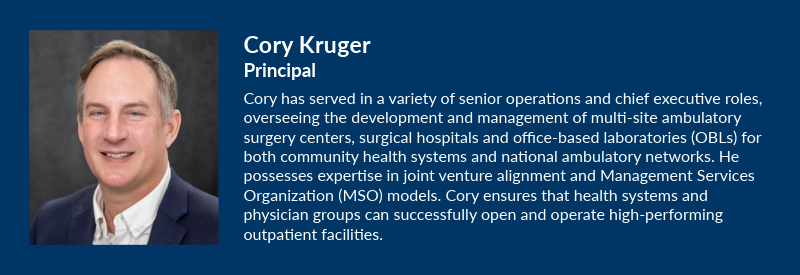
Kada Health News & Insights
The 3 Stages of Opening and Operating a Successful Ambulatory Surgery Center
April 7, 2025
7 min read time
BROWSE BY CATEGORY
Ambulatory Surgery Centers (ASCs) continue to grow at an unprecedented rate as patient care moves outside the walls of a traditional hospital outpatient setting. The Centers for Medicare and Medicaid Services (CMS) add more procedures to the ASC Covered Procedures List every year and continue to push for site-neutral payments to reduce the overall cost of care.
Ambulatory surgery centers are attractive to insurance companies, employers, patients and health systems. Health systems across the country are actively developing their ambulatory strategy to meet this demand. For provider organizations looking to open and operate a successful ASC or network of ASCs, we recommend a three-phase “Planning – Developing – Operating” approach.
Critical to the pro forma is an approach that builds and projects ASC volume by physician, by procedure and by payer. This information is essential for creating an accurate projection of revenues for the center.


Ambulatory surgery centers are attractive to insurance companies, employers, patients and health systems. Health systems across the country are actively developing their ambulatory strategy to meet this demand. For provider organizations looking to open and operate a successful ASC or network of ASCs, we recommend a three-phase “Planning – Developing – Operating” approach.
Step 1: Planning
The planning step is critical before opening a successful ASC. Start by asking important ‘due diligence’ questions to assess whether the time and environment are right for you to open an ASC.- Do you have the right types of procedures and enough ASC-applicable volume to justify your ASC?
- Are there sufficient opportunities for growth in your market?
- How will payers reimburse you for the care delivered?
- Can you access sufficient capital to support the necessary expenses incurred prior to opening the center and receiving reimbursement for care?
Critical to the pro forma is an approach that builds and projects ASC volume by physician, by procedure and by payer. This information is essential for creating an accurate projection of revenues for the center.

Step 2: Development
If the pro forma supports a “Go” decision, your next step in opening a successful ASC is the development stage. This is the lengthiest and most complex stage in the process. It requires the following “must-haves,” all of which possess their own specific processes that must be followed.- Financing – Securing funding should be an early step in the process. If you’re armed with a solid pro forma and sound business plan, you should be positioned for success.
- Facility Planning – This includes identifying the parcel of land the ASC will sit on, the type and size of ASC you want to construct, and if you want to buy versus lease.
- Capital Planning – Carefully consider any capital expenditures you will need to make. This includes everything from selecting the type and brand of operating room tables, anesthesia machines and surgical instrumentation trays to smaller but equally important decisions regarding the selection of medical supplies, office supplies and the various other purchasing decisions necessary for getting a facility ready for grand opening.
- Construction Project Management – You’ll want to meet regularly with a trusted architect, general contractor, mechanical and electrical engineers and more throughout the construction phase.
- Equipment & Supply Procurement – This goes hand in hand with capital planning and is a key step in ensuring you get the best pricing on equipment, medical supplies and pharmaceutical drugs. Participating in a group purchasing organization (GPO) will often enable you to ensure competitive pricing on many items versus going it alone.
- Workflow & Operations Plan Development – Developing a strategic workflow and operations plan is critical to the success of your ASC. Ambulatory Surgery Centers are meant to be efficient and lean. Create processes that streamline and optimize care and design your facility with these decisions in mind.
- Licensure & Certification Requirements – Prior to opening, you’ll need to make sure your facility has the appropriate licenses and certifications. ASCs must adhere to local, state and CMS licensing requirements. There will be multiple certifications required to open the facility.
- Governance Structure – If your ASC is a joint venture, all the involved parties will need to work closely with legal counsel to determine an appropriate means of governance. These details include the operating agreement, subscription agreements, board composition, voting rights and more.
- Facility Policies & Procedures Development and Implementation – Selecting an accreditation body, typically either the Accreditation Association for Ambulatory Health Care (AAAHC) or The Joint Commission (TJC), early in the process will shape your ASC’s future policies and procedures. This will keep your facility compliant and safe in the long run.
- Staff & Site Leadership Recruitment, Training & Support – In a tight labor market, this step is critical, as it will be both an initial and ongoing challenge for your nascent organization. Recruit and bring facility leaders on early in the process.

Step 3: Operations
Finally, there’s the actual business of running a business. Managing the daily operations of a successful ASC requires an effective management team who ensures the following key services are provided and performed well:- Accounting & Finance – We recommend you have a complete set of monthly financials, especially at the start of your business venture, when cash flow is relatively slow and has yet to reach that next gear of realized revenue and long-term profit.
- Maintain relationships with your banking partner – Regular meetings with your banking partner are a best practice.
- Clinical Services – We recommend that you have access to a clinical expert who knows best practices in patient care, quality improvement and benchmarking.
- Benchmarking – The Key Performance Indicators (KPIs) you establish at the start of your journey may need to be adjusted or replaced from time to time, ensuring you have a constant engine for growth and development.
- Policies & Procedures Implementation & Upkeep – Policies and Procedures need to be continuously maintained, edited and approved by the ASC’s governing bodies using local, state and federal regulations.
- Licensure & Accreditation Support – Licensure and accreditation standards must be maintained at all times.
- Compliance, Regulatory & Risk Assessment – This should be an ongoing area of operation to ensure you’re aligned with the constant and ever-shifting requirements of the regulatory landscape.
- Revenue Cycle Management – High-performing revenue cycle management services are essential. Accurate coding, timely claims filing, working accounts receivable, and collecting cash consistently are vital to the business. It is important that these services perform well on day 1.
- Marketing Support – Reaching your patient base will be a critical ongoing activity, often involving a multi-pronged marketing approach that uses digital tools including web development, social media and search engine optimization as well as traditional marketing efforts including press releases, print advertising and more.
- Strategic Planning for Growth – Having a plan ready for long-term growth will allow you to adapt to whatever the market throws your way. We recommend reviewing and adjusting your plan on at least an annual basis.
- 24/7 Operations Oversight – Finally, you will need someone to have the expertise and systems in place to manage all aspects of operations. The operations team interacts, coaches and leads the team by making sure all the services listed above are performed to the highest levels each and every day.
About the Author





